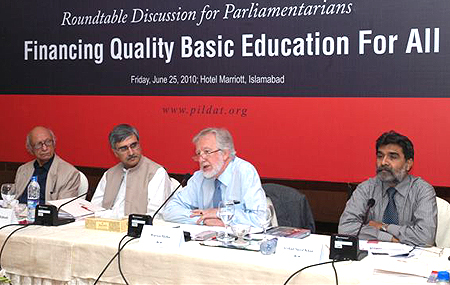| |
Islamabad June 25: In a Roundtable Discussion held by PILDAT, it was unanimously agreed that one of the major problems faced by the education sector in Pakistan is inequality in the education system. PILDAT in association with UNESCO arranged a Roundtable Discussion on �Financing Quality Basic Education For All� in Islamabad today where participants insisted the Government to get rid of the discriminatory education system and demanded uniform quality basic education for all. |
|
| |
Mr. Ahmed Bilal Mehboob, Executive Director-PILDAT in his opening comments, stressed that in our education system lack of resources is not a problem but the problem arises due to misuse of resources. He referred the drive for uniform quality education for all as a �War against illiteracy.�
|
|
| |
Dr. Warren Mellor, Director UNESCO and Mr. Arshad Saeed Khan, Senior National Specialist�Education, UNESCO in their joint presentation highlighted that marginalized groups can only be reached by improving financing of basic education. They introduced the UNESCO EFA Global Monitoring Report (2010): Progress on the six EFA goals and position of Pakistan in relation to those goals including early childhood care and education, free and compulsory basic education. Learning opportunities for young and adults, literacy rate (50%), elimination of gender disparities and learning achievements. Highlighting various facts and figures, they said that immediate legislation for implementation of Article 25-A of the Constitution (18th Constitutional Amendment) is needed. Elementary education should be completely free and the target of education budget up to 7% GDP by 2015, a target of the National Education Policy, needs to be implemented. They further stressed on the enforcement of Compulsory Primary Education Acts by the provinces and urged the Parliamentarians to lead the EFA cCampaigns in their constituencies and a pledge to make Pakistan a 100% literate nation. |
|
| |
Senator S. M. Zafar, Chairman Senate Standing Committee on Education, said that there is a lack of political will to promote uniform education system but we cannot blame only the Government in this regard; the role of media and civil society is equally important. Feudal culture of Pakistan is also one of the factors responsible of illiteracy in our society. Senator Zafar strongly condemned the cut on the Education Budget and urged the Parliamentarians to improve the state of education system in Pakistan. He was of the opinion that the decrease in school enrollment rate is directly proportional to the increase in crime rate in the country. |
|
| |
During the discussion session Mr. Omar Ayub Khan, Former Finance Minister said that we cannot achieve 7% GDP in such economic environment. He further added that education budget of districts and tehsils and UCs need to be analyzed to improve the education system in Pakistan and Provincial Assemblies have a great role to play in this regard. Senator Fauzia Fakhar uz Zaman denounced the huge gap between the education standards of rich and poor. She urged the Government to improve the conditions of government schools so that a uniform education system should be followed in the country. |
|
| |
Ms. Tahira Abdullah stressed on the vocational trainings of primary school girls. While talking on the topic, she criticized the cuts made on social sector budget including education while there is never any cut on the defence budget and others. She also urged the Government to promote adult education of 18-40 years of age. She also stated that only financing alone will not solve the problem, monitoring, controlling and evaluating are also critical for the success of any plan. |
|
| |
Senator Haji Ghulam Ali demanded to strengthen the educational institutions at districts levels while he also forced the inclusion of local community in promoting quality basic education. |
|
| |
Senator Hafiz Rashid Ahmed said that terrorism and illiteracy are interlinked with each other and we can overcome terrorism by providing education to the marginalized sections of the society. |
|
| |
|
|
| |
|
|
| |

|
|
| |
|
|
| |

|
|
| |
|
|
| |

|
|